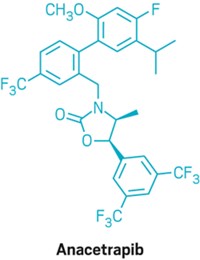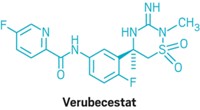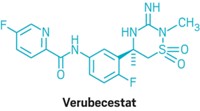Advertisement
Grab your lab coat. Let's get started
Welcome!
Welcome!
Create an account below to get 6 C&EN articles per month, receive newsletters and more - all free.
It seems this is your first time logging in online. Please enter the following information to continue.
As an ACS member you automatically get access to this site. All we need is few more details to create your reading experience.
Not you? Sign in with a different account.
Not you? Sign in with a different account.
ERROR 1
ERROR 1
ERROR 2
ERROR 2
ERROR 2
ERROR 2
ERROR 2
Password and Confirm password must match.
If you have an ACS member number, please enter it here so we can link this account to your membership. (optional)
ERROR 2
ACS values your privacy. By submitting your information, you are gaining access to C&EN and subscribing to our weekly newsletter. We use the information you provide to make your reading experience better, and we will never sell your data to third party members.
Pharmaceuticals
Pfizer's torcetrapib fails to slow arterial plaque buildup
by Michael McCoy
April 2, 2007
| A version of this story appeared in
Volume 85, Issue 14
A new study on the Pfizer drug torcetrapib found that it does not slow plaque buildup in the coronary arteries, despite raising by more than 60% the levels of high-density lipoprotein cholesterol, the so-called good cholesterol.
Plaque buildup in the coronary arteries, also known as atherosclerosis, can lead to heart attack and stroke. Researchers were disappointed by the study's results, because they had anticipated that good cholesterol would prevent plaque deposition on artery walls. The finding now casts doubts on other drugs that are being developed to raise good cholesterol.
The study was presented by Cleveland Clinic researchers last week in New Orleans at the American College of Cardiology's annual scientific meeting. It found that a drug combining torcetrapib and atorvastatin, better known as Lipitor, markedly raised levels of good cholesterol while lowering levels of low-density lipoprotein, or "bad," cholesterol.
"Unfortunately, this drug also substantially raised blood pressure and failed to slow the buildup of plaque," said Steven E. Nissen, chairman of cardiovascular medicine at Cleveland Clinic and the study's lead investigator.
Pfizer stopped development on torcetrapib in December after the safety board monitoring the company's clinical trial reported that the drug increased the risk of patient death. But Pfizer and drug companies such as Merck and Roche continue to develop drugs that, like torcetrapib, raise good cholesterol by inhibiting the cholesteryl ester transfer protein.
Commenting on the study results, Nissen said, "It is yet to be determined if this failure represents a problem unique to torcetrapib or predicts a lack of efficacy for the entire class of similar drugs."





Join the conversation
Contact the reporter
Submit a Letter to the Editor for publication
Engage with us on Twitter